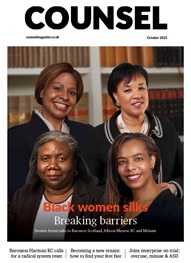*/
Referral fees lead to bad service and should not be permitted for barristers or other lawyers, while putting a limit on costs in advance is “neither necessary nor appropriate”, the Bar Council has said in its response to the Jackson review on the costs of civil litigation.
Claimants should continue to be able to recover 100 per cent of their damages award and should not see those damages reduced by unrecoverable but reasonably incurred costs, according to a Bar Council working group, chaired by Michael Todd QC, who led the response. The general rule that the loser pays the winner’s costs was “fair and effective”, the group concluded.
On case management, the group said there was no single approach that was appropriate and it was important instead to have a flexible system.
Lord Justice Jackson published his Preliminary Report on the costs of civil litigation in May, with a final report expected at the end of 2009. The Chairman of the Bar Council, Desmond Browne QC, said: “It is clear to me that whatever the future of conditional fee agreements, we need to be considering innovations in funding as well as adapting current funding models.”
Former Chairman of the Bar, Guy Mansfield QC’s discussion paper on whether a Contingency Legal Aid Fund (“CLAF”) could be established has also been published. He found CLAF to be a viable project, and that different approaches might suit different areas—defamation might benefit from a “boutique CLAF”, while personal injury and clinical negligence raised different issues
Lord Justice Jackson published his Preliminary Report on the costs of civil litigation in May, with a final report expected at the end of 2009. The Chairman of the Bar Council, Desmond Browne QC, said: “It is clear to me that whatever the future of conditional fee agreements, we need to be considering innovations in funding as well as adapting current funding models.”
Former Chairman of the Bar, Guy Mansfield QC’s discussion paper on whether a Contingency Legal Aid Fund (“CLAF”) could be established has also been published. He found CLAF to be a viable project, and that different approaches might suit different areas—defamation might benefit from a “boutique CLAF”, while personal injury and clinical negligence raised different issues
Referral fees lead to bad service and should not be permitted for barristers or other lawyers, while putting a limit on costs in advance is “neither necessary nor appropriate”, the Bar Council has said in its response to the Jackson review on the costs of civil litigation.
Claimants should continue to be able to recover 100 per cent of their damages award and should not see those damages reduced by unrecoverable but reasonably incurred costs, according to a Bar Council working group, chaired by Michael Todd QC, who led the response. The general rule that the loser pays the winner’s costs was “fair and effective”, the group concluded.
On case management, the group said there was no single approach that was appropriate and it was important instead to have a flexible system.


Justice system requires urgent attention and next steps on the Harman Review
Q&A with Tim Lynch of Jordan Lynch Private Finance
By Marie Law, Director of Toxicology at AlphaBiolabs
By Louise Crush of Westgate Wealth Management
Why Virtual Assistants Can Meet the Legal Profession’s Exacting Standards
Despite increased awareness, why are AI hallucinations continuing to infiltrate court cases at an alarming rate? Matthew Lee investigates
Many disabled barristers face entrenched obstacles to KC appointment – both procedural and systemic, writes Diego F Soto-Miranda
The proscribing of Palestine Action under the Terrorism Act is an assault on the English language and on civil liberties, argues Paul Harris SC, founder of the Bar Human Rights Committee
For over three decades, the Bar Mock Trial Competition has boosted the skills, knowledge and confidence of tens of thousands of state school students – as sixth-form teacher Conor Duffy and Young Citizens’ Akasa Pradhan report
Suzie Miller’s latest play puts the legal system centre stage once more. Will it galvanise change? asks Rehna Azim